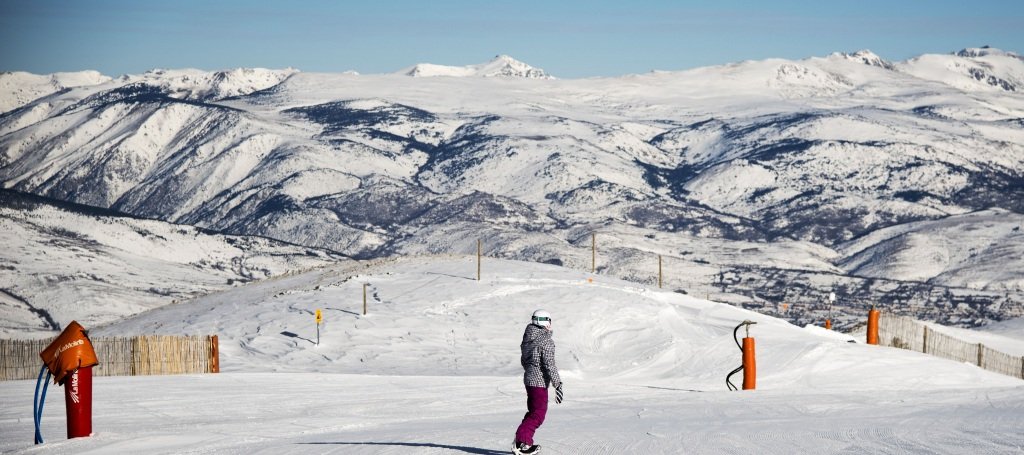Two different referenda, with different questions, but held on the same day: July 24th. This is the Catalan government's decision on how it will carry out the promised consultation of the views of the Pyrenean people affected by the bid for the 2030 Winter Olympics. Catalan president Pere Aragonès signed the decree this morning to go ahead with the vote, and as ministers Laura Vilagrà and Victòria Alsina explained, they reached a formula which, on the one hand, consulted the view of the six Alt Pirineu and Aran counties directly involved (Val d'Aran, Alta Ribagorça, Pallars Sobirà, Pallars Jussà, Alt Urgell and Cerdanya) on whether the bid should go ahead, and on the other, also allowed three indirectly affected territories, Ripollès, Solsonès and Berguedà, to vote to "opt out" if they so wished, in a second question with different wording. The announcement on the public consultation comes three days after the Spanish Olympic Committee approved the joint Catalonia-Aragon bid for the Games, despite Aragon's rejection of the current distribution of games events and venues.
Thus, the first consultation, focused on the six mountain counties in north-west Catalonia (Val d'Aran, Alta Ribagorça, Pallars Sobirà, Pallars Jussà, Alt Urgell and Cerdanya), will ask the following question: "Should the Catalan government present a bid for the 2030 Olympic and Paralympic Games?" The possible answers will be "Yes, it should present [a bid]", or "No, it should not present [a bid]", with the verb presentar -"present"- included in the question so as not to give rise to possible confusion. With data still not definitive, the Catalan government estimates that in this district there will be about 121 polling stations and about 55,000 people will be eligible to vote. The second consultation, which will be held on the same day, will be for the other three adjoining mountain territories, Ripollès, Solsonès and Berguedà, where about 63,000 people will be able to vote at 137 voting centres, in response to the following question: "Should your county be involved in the 2030 Olympic and Paralympic Games project?", again the response will be yes or no to "being involved" in the project.
"We'll take it into account"
In the Alt Pirineu and Aran, the totals will be "for the whole" of the district, with votes from all six counties added together to get a single result, while in Ripollès, Berguedà and Solsonès, the counting - and thus decision - will be made county by county, and in no case will a minimum turn-out be set. The minister Vilagrà assured that both questions will be binding, although the interpretation is different since in the first case the members of the public are being asked whether or not to the candidacy should be presented, while in the second, the only question is whether the county in which the voter lives should be involved in the project or not. Regarding what this "involvement" means, Vilagrà specified that in these counties there could be training, technical activities, construction work and sports activities complementary to the Olympic disciplines: "If they do not want to be involved, we will take it into account, and ensure that those activities do not happen there," she said.
No internet voting option
Despite being scheduled during the summer holiday period, voting will be allowed in person: there will be no telematic voting, no postal voting or early voting, explained Alsina, who said that the decision not to use the telematic option is due to issues of logistics, deadlines, "and due to the increase in associated costs." Alsina justified this decision by arguing that in Catalonia there is no good legal framework for participatory processes, and said that the government will be working on legislation for public participation that will resolve this issue but it will not be ready for July 24th. And why that date? As the ministers explained, because it is "the nearest date on which voting could be [legally] held", bearing in mind the deadlines, and also stressing that it is the day before the celebration of the 30th anniversary of the 1992 Barcelona Olympic Games.
The organization of these district referenda will cost 1.1 million euros, including the costs of publicity campaigns, advertisements and other events. Another of the characteristics of the consultation explained by the transparency minister is that the Catalan government will run a neutral campaign, in the sense that what it will encourage is for people to vote, without taking sides. This position is new: the minister Alsina had said during a session of Parliament that the executive would campaign for "yes". Thus, she finally clarified that it will be the political parties that will campaign for or against the Olympic Games candidacy.
All this comes after months of unknowns about the characteristics of this public consultation, which the Catalan government had initially announced would be during the spring and only in the Alt Pirineu and Aran. In the end, it was delayed, while demands were also being made to include the other three territories: in Parliament, both ERC and Junts approved a proposal urging the government to incorporate Ripollès, Solsonès and Berguedà into this participatory process, without entering in details of what their role should be: it asked for this to be decided by consensus. Hence, with its incorporating of these three counties into the consultation, the Generalitat is now fulfilling the mandate of Parliament, which did not specify how these territories were to participate.

